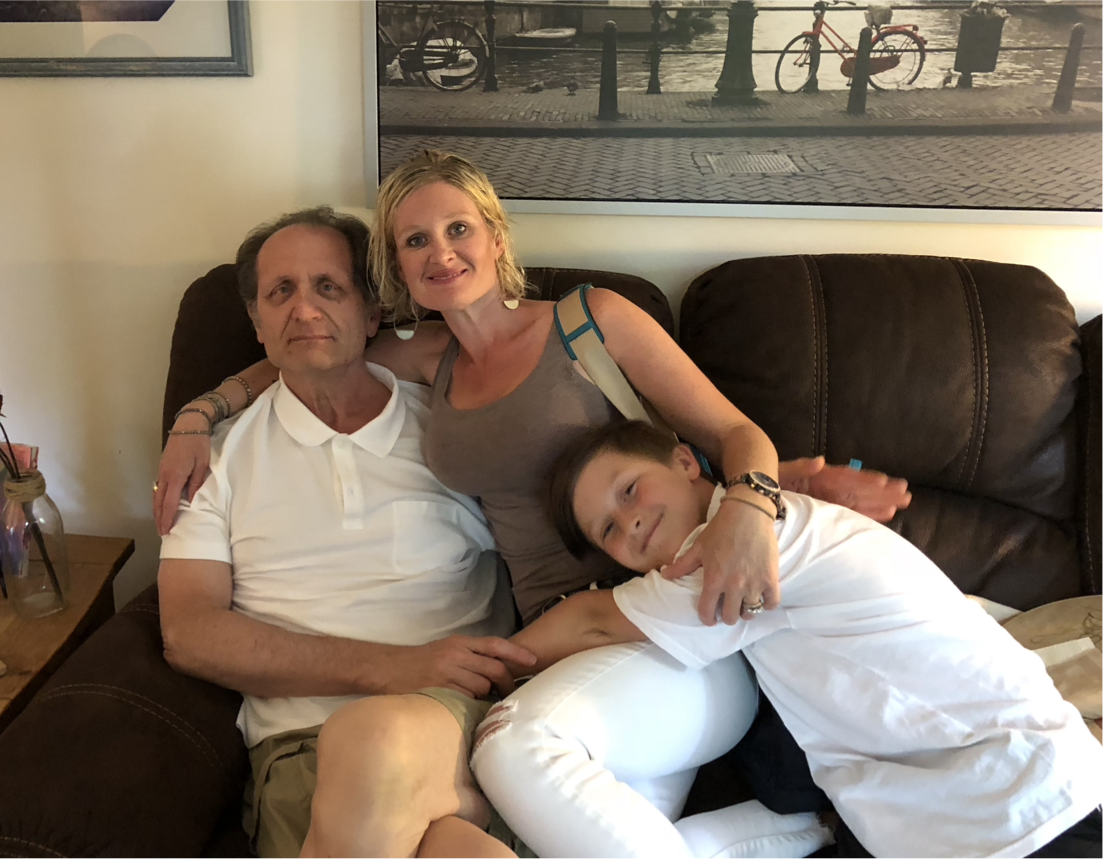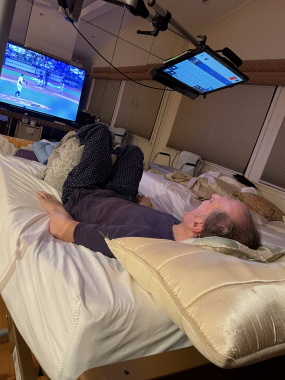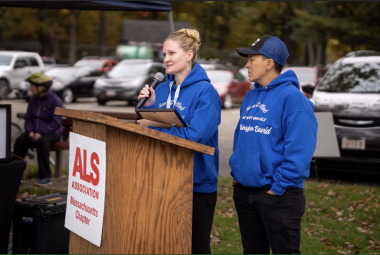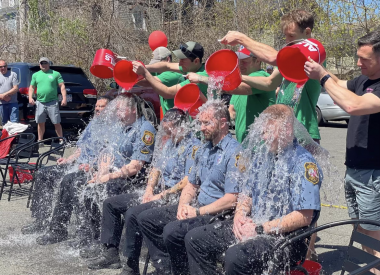Working to Make Sure ‘Another Loving Father’ Isn’t Lost to ALS

Tara Gottlieb sitting with her father, David Gottlieb, and her son, Jack. (Courtesy of Tara Gottlieb)
Tara Gottlieb lost her father to amyotrophic lateral sclerosis (ALS) in November, but the Massachusetts resident said she’s only just begun advocating for people with the disease and working to help find a cure.
Gottlieb remembers her father, David Gottlieb, as a generous, selfless, caring man. She and her brother, Brian, were the luckiest children alive because of how much love he showed them.
“He was just so sweet and he loved sweetness,” Tara Gottlieb, 46, said in a phone interview with ALS News Today.
When her son, Jack, was born, his grandfather quickly developed a close relationship with the boy. They wrote letters to each other and jumped on FaceTime calls. He called Jack, who is now 13, “my little buddy.”

David Gottlieb watching a New York Yankees baseball game. (Photos courtesy of Tara Gottlieb)
But when David Gottlieb, then 70, woke up one morning slurring his speech, things began to change quickly. Within a month he was diagnosed with ALS and lost his ability to walk. By July he could no longer move — a disease state referred to as being “locked in.” He could see and hear, but his body was paralyzed.
A ‘different person’
His behavior also changed. He would have sudden bouts of laughter and crying, known as pseudobulbar affect, and he developed frontotemporal dementia.
“He just became a different person than the guy that we knew,” his daughter said from her home in Northampton.
Caring for a person with rapid ALS progression was like shooting at a moving target. By the time her father got a power wheelchair, he could barely move his finger, Gottlieb said. The family had a technician add a headpiece to act as a joystick for the chair, but about a week later he lost the ability to move his head.
Communicating was also very difficult. David Gottlieb received an eye gaze machine, but within two weeks, it became nearly impossible for him to focus on the letters. His son created a letter board and was able to determine manually what the older man was looking at. But it didn’t always work, and Gottlieb knew that frustrated her father.
Care became a 24/7 job for Tara’s brother and mother. David Gottlieb barely slept because he was in so much pain. Gottlieb recalls a 72-hour window where her father lay awake and moaned. And when he didn’t sleep, neither did his family.
The one respite was Yankee baseball games. David Gottlieb was a lifelong fan, having lived 20 minutes outside Manhattan where he owned his own electrical component sales company, and would follow for hours every inning of a televised game, allowing his family some much-needed rest.
Gottlieb remembered calling the Yankees front office to ask about giving her father a shout-out on the stadium’s jumbotron, which the office did during one regular season game. The outdoor video screen read:
“David Gottlieb,
We’re all thinking of you.
Love,
The New York Yankees”
Gottlieb died six months after his diagnosis.
Committed to a cure for ALS
The changes ALS brought to her father and its rapid progression made Tara Gottlieb even more committed to being part of finding a cure for ALS and helping other families. She started as a manager of community engagement and events with the ALS Association in February, working to raise money for care and research through the Walk to Defeat ALS events in Western Massachusetts and Boston set for September and October.

Tara Gottlieb speaking at the Western Massachusetts ALS Association’s Walk to Defeat ALS in 2021.
While her father was sick, Gottlieb spotted a sign for the Western Massachusetts ALS Association walk, which happened to be in the city she called home. She raised around $7,000 in 2021, earning her “Top Fundraising Individual” credit. She made “Team David” sweatshirts, and she spoke before the walk.
“I remember hearing that the mission of the ALS Association is to make ALS a livable disease by 2030,” Gottlieb said. “When I heard that, I really felt like I wanted to do all I can to play a role in that.”
She credits the families she met at those walks with inspiring her to continue working in the ALS community after her father died.
Diane Shumway made Gottlieb feel like family. Shumway, who had recently lost her husband to ALS, attended the 2021 Western Massachusetts walk with her two daughters and grandchildren.
When Gottlieb organized an ice bucket challenge for Northampton first responders in May, on the first day of ALS Awareness Month, Shumway showed up.
“It’s like a real community,” Gottlieb said. “I feel like we just support each other.”
Through her ALS Association work, she hopes to support other families facing the challenge of caring for someone with ALS. She said she can relate to living through the physical and emotional toll that comes from a single diagnosis.
A large portion of the money raised through walks directly helps ALS patients in ways she said her family would have wanted to be helped. Funds go to adding wheelchair-accessible ramps to houses, filling out loan closets with medical equipment, and keeping support groups freely accessible.
Her goal this year is to raise $100,000 for the Western Massachusetts walk and $300,000 for the Boston one. They’re lofty goals: last year the ALS Association brought in $70,000 for Western Massachusetts and $200,000 for Boston. That’s short of pre-pandemic levels, but totals are again trending upward, according to Ashley Carrier, director of community engagement and events in New England for the ALS Association Massachusetts Chapter.
Making connections through the challenges
Gottlieb was first drawn to the ALS Association because of its supportive staff. After her father’s diagnosis, she navigated to its website’s newly diagnosed section and entered her contact information. She got a phone call within 10 minutes from a Care Services staff member and was sent packets of information about the disease.

Tara Gottlieb organized an ice bucket challenge with local first responders to kick off ALS Awareness Month last year.
A close relationship with Carrier — who at the time served as senior manager of corporate and community engagement for the ALS Association Massachusetts Chapter — led Gottlieb to a full-time position at the association.
She credits Carrier, who spoke to her shortly after her father’s diagnosis and sent a personal card after he died, with helping her overcome personal challenges.
Gottlieb was unemployed at the time, having had to close her Visiting Angels franchise because of a caregiver shortage. She said her position with the association holds a greater meaning for her.
“I want to play a role in making it a livable disease, in finding a cure, and I would do whatever I could,” she said
Hitting close to home
Working for an organization that focuses on the disease that took her father has not been easy, Gottlieb said. She receives emails every time someone with ALS in Massachusetts dies. She sees people with ALS who remind her of her father and his rapid progression, forcing her to occasionally excuse herself from meetings. She didn’t know early on if working for the ALS Association was the right decision, given how close she was to the disease.
“But as time went on, I realized that it’s actually a positive thing,” she said. “I don’t want to forget about ALS.”
Gottlieb’s parents used to often visit her and her wife, Irma Lopez-Gottlieb, and their three children in Massachusetts. One day, Gottlieb and her father were sitting together on a park bench watching birds.
The birds “were feeding each other and [David] got tears in his eyes, because of how sweet it was,” she said. “It’s something that he brought up a couple more times.”
That memory has stuck with her in the midst of her father’s absence. It’s one of many that pushes her toward working to find a cure for ALS.
Gottlieb is a woman on a mission: She doesn’t want another loving father to ever be taken away from anyone else.








